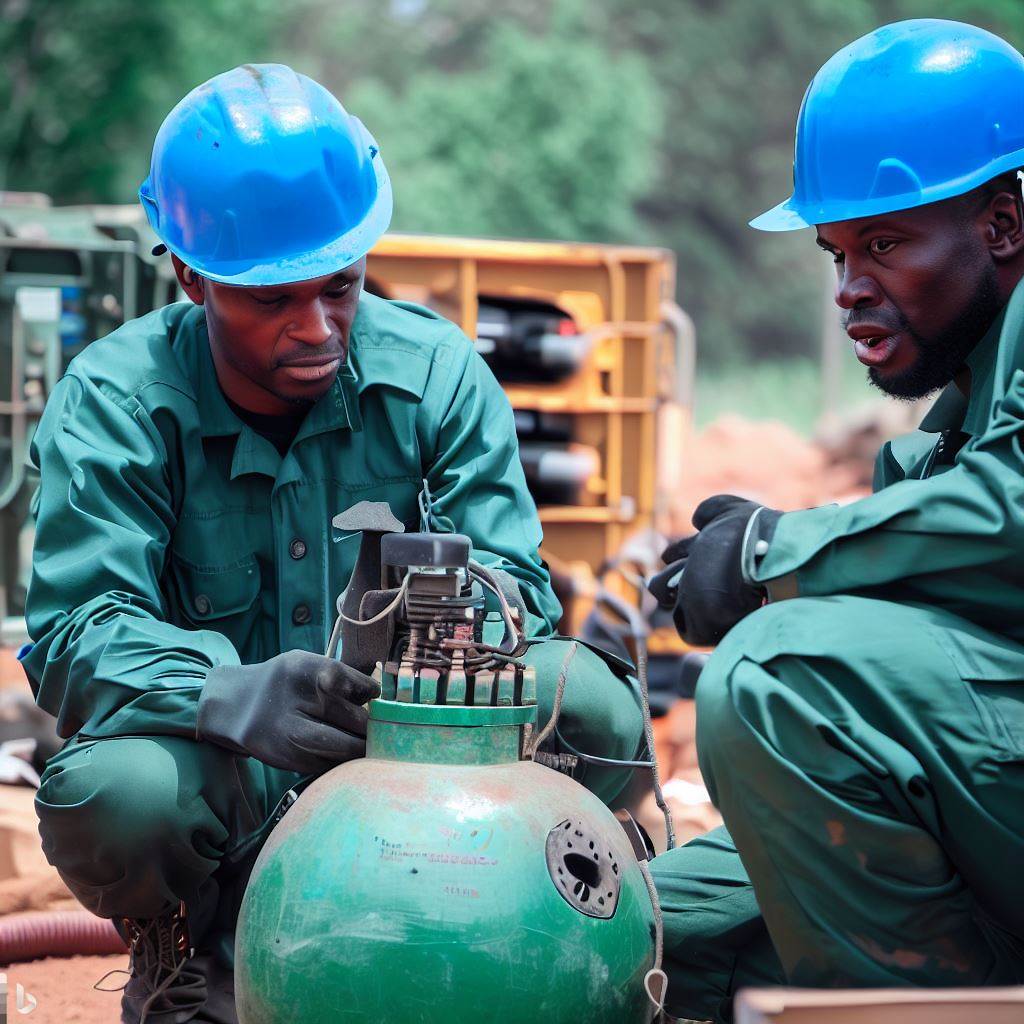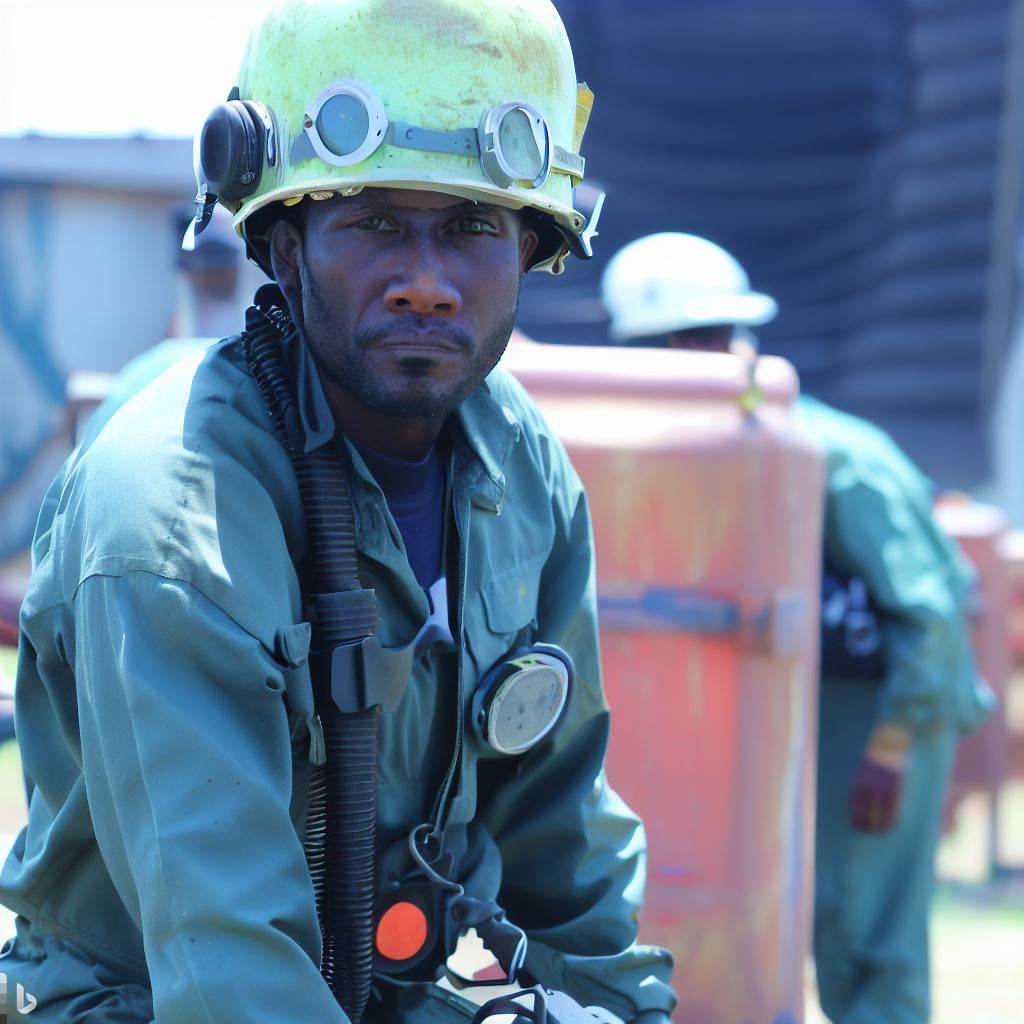Introduction
The dynamism of Nigeria’s bomb disposal field hinges on international collaboration, a powerful catalyst for progress. This blog post explores International Collaboration in Nigeria Bomb Disposal.
This post delves into the purpose and paramount significance of discussing this subject, shedding light on its far-reaching implications for security and stability.
Background of Nigeria’s bomb disposal field
Overview of the current state of Nigeria’s bomb disposal operations
Nigeria has been facing a significant threat from bomb attacks in recent years. Bomb disposal operations in the country are primarily carried out by the police force.
Due to the increase in bombings, Nigeria has recognized the need for robust bomb disposal capabilities. The Nigerian police force has been actively working to improve their expertise and equipment in this field.
However, there is still a significant gap in terms of the country’s bomb disposal capabilities.
Challenges and risks associated with bomb disposal in Nigeria
- The presence of improvised explosive devices (IEDs) has become widespread in Nigeria.
- Bomb disposal experts face numerous risks while handling explosive devices.
- Nigeria’s bomb disposal field lacks sufficient funding and resources.
- Explosive materials used in bombings are becoming more sophisticated and hard to detect.
- The lack of proper training and equipment increases the danger for bomb disposal teams.
Importance of international collaboration in enhancing Nigeria’s bomb disposal capabilities
- International collaboration can provide Nigeria with access to advanced bomb disposal technologies.
- Foreign experts can share their knowledge and expertise to enhance Nigeria’s bomb disposal techniques.
- Collaboration with other countries allows Nigeria to benefit from best practices and lessons learned.
- International partnerships can boost Nigeria’s intelligence gathering and information sharing capabilities.
- By working together, countries can collectively combat the global threat of terrorism and extremist violence.
Nigeria’s bomb disposal field is facing significant challenges and risks due to the increased threat of bombings.
However, international collaboration offers a promising solution to enhance Nigeria’s bomb disposal capabilities.
Through the exchange of technologies, knowledge, and best practices, Nigeria can improve its ability to handle explosive devices effectively.
Strengthening international partnerships will not only benefit Nigeria but also contribute to global efforts in combating terrorism and ensuring the safety of nations.
Read: Veterans in Bomb Disposal: A Pathway in Nigeria
The benefits of international collaboration in Nigeria’s bomb disposal field
Expertise and specialized knowledge
International collaboration in Nigeria’s bomb disposal field brings in expertise and specialized knowledge from various countries.
Collaborating with experts from different countries allows Nigerian bomb disposal teams to learn new techniques and strategies.
International partners can provide valuable insights and experiences that contribute to improving Nigeria’s bomb disposal capabilities.
The exchange of expertise and specialized knowledge leads to enhanced efficiency and effectiveness in dealing with explosive devices.
Sharing resources, equipment, and advanced technology
International collaboration facilitates the sharing of resources, equipment, and advanced technology among different countries.
Transform Your Career in Nigeria
Discover unmatched expertise with our personalized Career Consulting service. Navigate Nigeria’s job market with a strategy tailored just for you.
Get StartedPartner nations can offer access to state-of-the-art bomb disposal equipment and tools that may not be readily available in Nigeria.
Sharing resources and equipment ensures that Nigerian bomb disposal units have access to the best tools and technology available.
Collaboration also allows for the joint development of new technologies and innovations in bomb disposal.
Capacity building and training opportunities
International collaboration plays a crucial role in capacity building and training opportunities for Nigerian bomb disposal units.
Working alongside international partners provides Nigerian teams with invaluable training and knowledge transfer.
Collaborative exercises, workshops, and exchange programs help enhance the skills and capabilities of Nigerian bomb disposal personnel.
International collaboration enables Nigerian bomb disposal units to stay updated on the latest practices and advancements in the field.
By participating in joint training initiatives, Nigerian units can develop their capacity to handle complex bomb threats.
In fact, international collaboration in Nigeria’s bomb disposal field brings several benefits.
The exchange of expertise and specialized knowledge improves the efficiency and effectiveness of bomb disposal operations.
Sharing resources, equipment, and advanced technology ensures that Nigerian bomb disposal units have access to the best tools available.
Collaboration also plays a vital role in capacity building and training opportunities for Nigerian personnel.
By leveraging international partnerships, Nigeria can enhance its bomb disposal capabilities and better protect its citizens from the threat of explosive devices.
Read: Career Growth and Opportunities in Bomb Disposal in Nigeria
Successful examples of international collaboration in Nigeria’s bomb disposal field
Notable partnerships or initiatives that have made a positive impact
- The United Nations has been actively involved in supporting Nigeria’s bomb disposal efforts.
- Partnerships with the United States and European countries have provided crucial training and resources.
- The Nigerian government has collaborated with international organizations like INTERPOL to share intelligence and expertise.
Specific case studies or incidents showcasing the effectiveness of international collaboration
- In 2011, a joint operation between Nigerian and American authorities successfully dismantled a major bomb-making facility.
- The involvement of British bomb disposal experts during the search and rescue mission after the 2014 Chibok school bombing greatly enhanced operations.
- An international team, including experts from Germany and France, assisted in the safe disposal of a complex explosive device in Abuja in 2018.
Analyzing the outcomes and lessons learned from these collaborative efforts
The outcomes of these collaborative efforts have been significant in Nigeria’s bomb disposal field.
Firstly, the involvement of international partners has improved the technical capabilities of Nigerian bomb disposal units.
Through training programs and exchange of knowledge, Nigeria’s bomb disposal teams have acquired advanced skills and tactics.
Secondly, international collaboration has helped in intelligence sharing and early detection of potential threats.
Partnerships with foreign agencies have allowed Nigerian security forces to access crucial information and stay one step ahead of terrorist organizations.
Additionally, collaborative efforts have facilitated timely response and effective coordination during bomb disposal operations.
The combined expertise of Nigerian and international experts has reduced the risks involved and improved success rates.
Lessons learned from the collaborations
Lessons learned from these collaborations include the importance of establishing strong communication channels and a culture of trust.
Regular information sharing, joint training exercises, and maintaining up-to-date technology are crucial for long-term success.
Moreover, these partnerships have emphasized the need for sustained international support in Nigeria’s bomb disposal field.
Publish Your Professional Profile, Business or Brand
Showcase your expertise, gain trust, and boost visibility instantly on Professions.ng.
Publish NowFinancial aid, resources, and ongoing training are essential to ensure the continued effectiveness of collaborative efforts.
In essence, international collaboration in Nigeria’s bomb disposal field has had a positive impact.
Notable partnerships and initiatives, such as those with the United Nations and different countries, have proven successful.
Case studies and incidents highlight the effectiveness of collaborative efforts in dismantling bomb-making facilities and safely disposing of explosive devices.
Outcomes include improved technical capabilities, enhanced intelligence sharing, and better coordination during operations.
Lessons learned emphasize the importance of communication, trust, and sustained support for long-term success in this critical field.
Read: Legal Requirements for Bomb Technicians in Nigeria

Challenges and Limitations to International Collaboration in Nigeria’s Bomb Disposal Field
Barriers and Obstacles Hindering Effective Collaboration
Collaboration in Nigeria’s bomb disposal field faces numerous barriers that impede its effectiveness.
- Language and Cultural Differences: Language barriers and cultural differences can hinder effective communication and understanding among international collaborators.
- Lack of Trust: Building trust among different countries and organizations is essential for successful collaboration, but it can be challenging to establish in an area like bomb disposal where security concerns are paramount.
- Limited Resources: Insufficient resources, including technology, funding, and training, can hinder collaboration efforts, especially when collaborating with countries that have more advanced systems and infrastructure.
- Bureaucracy and Red Tape: Lengthy bureaucratic procedures and complex administrative processes can slow down collaboration, delaying the sharing of critical information and the implementation of joint projects.
- Information Sharing: Concerns about national security and the protection of sensitive information can limit the sharing of crucial intelligence and hinder effective collaboration.
Cultural, Logistical, Political, or Legal Challenges Impacting Collaboration Efforts
Collaboration in Nigeria’s bomb disposal field faces various challenges that are influenced by cultural, logistical, political, and legal factors.
- Cultural Differences: Different cultural norms, practices, and perceptions can impact collaboration as they often shape decision-making processes and approaches to problem-solving.
- Logistical Challenges: Nigeria’s vast size and diverse terrain present logistical challenges, such as transportation difficulties and remote locations, making it challenging to coordinate and conduct joint operations.
- Political Interference: Political interference or conflicts of interest might impede collaboration efforts by prioritizing individual country’s political agendas over the common goal of enhancing bomb disposal capabilities.
- Legal Frameworks: Differences in legal frameworks and regulations among collaborating countries can create difficulties in harmonizing procedures, sharing sensitive information, and conducting joint operations effectively.
Potential Risks and Drawbacks Associated with Overreliance on International Support
While international collaboration can bring numerous benefits, relying too heavily on foreign assistance in Nigeria’s bomb disposal field carries potential risks and drawbacks.
- Dependence on External Entities: Overreliance on international support might undermine Nigeria’s self-sufficiency and independence in addressing bomb disposal threats, potentially leaving gaps in security.
- Sustainability Concerns: Heavy reliance on international partners can pose sustainability challenges, as aid or support may be intermittent or withdrawn altogether, leaving Nigeria vulnerable.
- Lack of Local Expertise Development: Reliance on foreign expertise might hinder the development of local capabilities and expertise, limiting Nigeria’s ability to handle bomb disposal independently.
- Power Dynamics and Influence: Overreliance on foreign support can lead to power imbalances, with collaborating countries exerting undue influence or controlling decisions that affect Nigeria’s security landscape.
- Limited Transfer of Knowledge: If collaboration focuses solely on joint operations without a significant knowledge-sharing component, Nigeria might miss out on critical learning opportunities to enhance its own capabilities.
In review, international collaboration in the Nigeria bomb disposal field faces several challenges and limitations that hinder its effectiveness.
Identifying barriers, addressing cultural, logistical, political, and legal challenges, and mitigating the risks associated with overreliance on foreign support are crucial for enhancing collaboration efforts and ensuring Nigeria’s self-sufficiency in bomb disposal operations.
Read: Women in Bomb Disposal: Breaking Barriers in Nigeria
Recommendations for strengthening international collaboration in Nigeria’s bomb disposal field
Suggestions for improving coordination and communication channels
- Establish a centralized database to track all bomb disposal activities and share information.
- Create a secure online platform for real-time communication among international stakeholders.
- Implement regular joint training programs to enhance coordination and foster mutual understanding.
- Encourage the use of standardized terminology and protocols to facilitate effective communication.
- Establish a dedicated communication hotline for immediate information exchange during emergency situations.
Importance of establishing long-term partnerships and networks
- Forge alliances with international bomb disposal organizations to leverage their expertise and resources.
- Prioritize the creation of sustainable partnerships to ensure consistent support and knowledge sharing.
- Facilitate regular exchange programs, allowing Nigerian bomb disposal experts to learn from international counterparts.
- Establish research collaborations to jointly develop innovative techniques and tools in bomb disposal.
- Increase participation in international conferences and workshops to build relationships and share best practices.
Strategies for overcoming the challenges and limitations identified earlier
- Invest in advanced technology and equipment to enhance bomb detection and disposal capabilities.
- Allocate sufficient funding to support international collaboration initiatives in the bomb disposal field.
- Strengthen inter-agency cooperation within Nigeria to ensure effective coordination with international partners.
- Facilitate the exchange of intelligence and information on emerging bomb threat trends.
- Enhance training programs to address knowledge gaps and improve the skills and expertise of bomb disposal personnel.
In a nutshell, strengthening international collaboration in the Nigeria bomb disposal field is crucial to effectively combat the growing threat of terrorism.
By improving coordination and communication channels, establishing long-term partnerships, and implementing strategies to overcome challenges, Nigeria can enhance its bomb disposal capabilities and reduce the risk posed by explosive devices.
International collaboration is essential in sharing expertise, resources, and best practices to ensure a safer future for Nigeria and the global community.
Conclusion
In this blog post, we explored the importance of international collaboration in the Nigeria bomb disposal field.
International collaboration has a significant impact on Nigeria’s bomb disposal field, as it helps in sharing expertise, resources, and best practices.
Moving forward, it is crucial for Nigeria to continue fostering partnerships and collaborations with other countries to enhance their bomb disposal capabilities.
By working together, countries can improve their intelligence sharing, training programs, and technological advancements in bomb disposal.
International collaboration also enables Nigeria to benefit from the experiences and lessons learned by other countries in dealing with similar challenges.
The involvement of multiple nations ensures a broader perspective, leading to more effective strategies and solutions for addressing bomb threats.
Moreover, international collaboration helps in strengthening diplomatic ties, fostering mutual trust, and promoting peace and security.
It is essential for Nigeria to actively engage in international conferences, workshops, and initiatives focused on bomb disposal.
By actively participating in these platforms, Nigeria can build strong partnerships, exchange knowledge, and learn from global experts in the field.
International collaboration is crucial for Nigeria’s bomb disposal field as it enhances their capabilities and contributes to promoting safety and security.
Let us continue to support and foster international collaboration in the future, ensuring a safer and more peaceful Nigeria.




